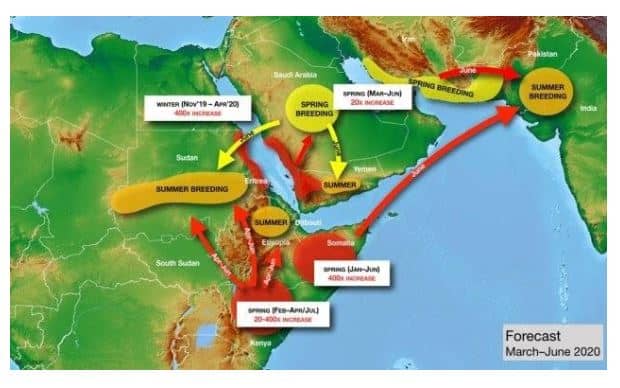UPSC Articles
Unusual Locusts attack in urban areas of India
Part of: GS-Prelims and GS-III – Climate change; Food security
In News:
- There have been unusual sightings of swarms of locusts even in urban areas of Rajasthan, parts of Madhya Pradesh and Vidarbha region of Maharashtra.
Key takeaways
- The desert locust (Schistocerca gregaria) is a short-horned grasshopper.
- It is usually harmless when it is unaccompanied.
- However, locusts undergo a behavioural change when their population builds up rapidly.
- They form huge swarms that can travel up to 150 km per day, eating up every bit of greenery on their way.
- These insects feed on a large variety of crops.
- They can threaten the food security of a country.
- In India, locusts are normally sighted during July- October along the Pakistan border.
- Their early arrival can be attributed to the following factors:
- Cyclonic storms Mekunu and Luban that had struck Oman and Yemen respectively in 2018 had turned large deserts tracts into lakes which facilitated locust breeding.
- Swarms attacking crops in East Africa reached peak populations from November 2019.
- The population increased in southern Iran and Pakistan since the beginning of 2020.
- Heavy rains in East Africa in March-April enabled further breeding.
- The swarms were aided by high-speed wind and thus they made their way to such urban areas.
- Their growth can be controlled by spraying insecticide on locusts’ night resting places like trees.
- Till date, the Locust Warning Organisation (LWO) has carried out spraying operations in Rajasthan.
- India has also ordered for specialised insecticide sprayers with the UK.
- Drones will also be used to spray the resting places.
Important value additions
Locust Warning Organisation (LWO)
- It comes under the Ministry of Agriculture & Farmers Welfare.
- It is responsible for monitoring, survey and control of Desert Locust in Scheduled Desert Areas mainly in the States of Rajasthan and Gujarat.

Image source: Click here












